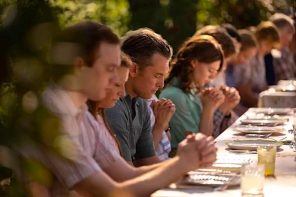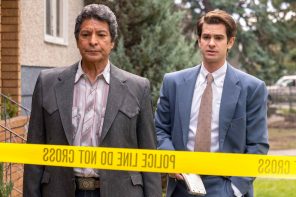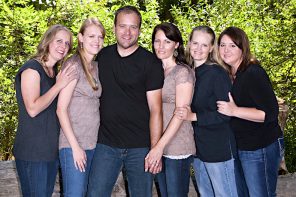This week, Oprah aired her exclusive look inside the Yearning for Zion Ranch, the Fundamentalist Latter Day Saints compound that was raided around this time last year. For me, the most interesting part of her visit was when she spoke with some teen girls and asked them frank questions about their lives and faith.
There aren’t any clips other than this one, which isn’t very indicative of the segment, and the print version doesn’t mention a single girl by name. I’m unsure whether the girls asked not to be named, but I have a hunch that their names were simply omitted since Oprah referred to them by name in the television version.
Oprah’s questions and remarks about their lives and faith were often condescending, expressing obvious skepticism that these women had the final say on whom they marry. She was surprised that the girls had cell phones and watched TV on occasion (though we’re told there is no TV on the ranch). The media (including Oprah) have framed these women with an outdated image of obedience and conformity that seems incongruous with modernity. This narrative is often one framed around religious women, especially around religions that are seen as cultish or very traditional.
Several of Oprah’s comments and questions highlighted this arrogant narrative: when asking the girls about polygynous marriage, her tone indicated the idea was distasteful, even after the girls explained their belief in and acceptance of the practice as a part of their faith and lifestyle. Another example is when Oprah remarked that all of the girls’ dresses looked alike. The girls, however, can tell the difference between the dresses, knowing that the differences are in the details. They explain that their bodies are sacred, and so they cover them. Oprah then asked them if they ever take their dresses off. “Of course,” they say. “When we go to sleep.”
These questions struck me as startlingly similar to ones that Muslim women are often asked about their headscarves and their own lives. “Do you ever take that off?” “Will your parents force you to marry?” Those who don’t grow up knowing the intricacies of abaya or headscarf styles don’t know how to tell one from another, just like the FLDS’ girls’ clothes, dubbed “prairie dresses”, were distinguishable to them because they were part of that fashion “culture.”
“Brainwashed” is a term often used or implied when referring to religious women. Oprah’s interview with Betty, an FLDS woman who was taken from the YFZ Ranch by her mother when she was 16 and who moved back to the Ranch when she was 18, highlights this part of the dominant narrative on religious women. Betty states that her mother assumes she is “brainwashed”, but she says she “rejoined FLDS because she wanted to return to her old life, family and religion.”
The FLDS women and girls say that they are still recovering from last year’s raid. It’s obviously left a large psychological impression, judging from some of the women’s emotional recounts of the ordeal. This could account for their enthusiastic and adamant affirmations of their faith and their way of life. They may have whitewashed anything negative about their way of life as a reaction to the overwhelmingly negative media portrayal of their religion, or in fear of another raid. Or they might actually be happy.
Either way, Oprah’s visit to the ranch was not illuminating or fresh. Because it recycled the same narratives about religious women as outdated and brainwashed, the only thing different about this program was the religion of the women interviewed.




